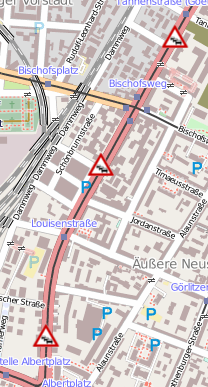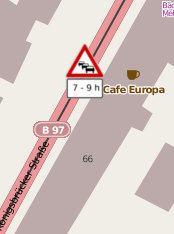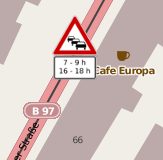Proposal:Traffic jam warning
| jams | |
|---|---|
| Proposal status: | Abandoned (inactive) |
| Proposed by: | SnakeBDD |
| Tagging: | jams=* |
| Applies to: | |
| Definition: | Ways or intersections with high potential for traffic jams |
| Statistics: |
|
| Rendered as: | icon |
| Draft started: | |
| Proposed on: | 2010-05-26 |
| RFC start: | 2010-05-26 |
| Vote end: | * |
Proposal_Page end
Summary
This tag marks roads or intersections with a high risk of traffic jams. This does not indicate an existing jam, only the chance for a jam.
Reasoning
Locals often know which roads are jammed during rush-hour and how to avoid the resulting traffic jams. However, it is hard for visitors to figure out when and where to expect these jams. This can lead to broken appointments or interferences with one's schedule in general.
This tag may be used by routing software to determine a jam-free route or by map viewers to consider delays caused by jams.
Tagging
Definition of traffic jams
A road is considered jammed in the context of this tag if you have to wait for several traffic signal periods to cross an intersection or if you need more time to travel through the tagged section than a pedestrian would need.
A traffic jam warning should be applied only if there is at least a 90% chance for a traffic jam in the specified interval on a normal day. If no interval is given, there should be a 90% chance for at least 3 independent jams on a 24h interval. A normal day is any working day expect for holidays or special occasions that could cause jams or the absence of jams.
Verification
If there is any kind of official warning (for example sign no. 124) this tag is automatically considered valid.
If there is no official information, you have to rely on statistical observation. You should make at least 10 observations in 5 weeks with at least one observation per week. Only observations on normal working days are considered. If the definition above applies to at least 90% of your observations, this tag is appropriate. You do not have to document your observations.
Falsification
If you don't think this tag is justified, you can proof it wrong. For a successful falsification you have to make at least 5 observations in 4 weeks, at least one observation per week. If the definition above does not apply to at least 40% of your observations your falsification is successful. You are now free to remove this tag. You should document your observations.
A falsification can be doubted within 4 weeks after the removal of the tag by sending a message to the mapper who removed the tag. After expressing your doubt, you have 5 weeks to repeat the verification process. You have to document your observations. If the repeated verification is successful, the falsification is invalid and you can apply this tag again.
After a successful falsification or a successfully doubted falsification, this tag is locked for the next 6 month or until major changes of the traffic infrastructure related to this tag occur. During that lock, this tag may not be changed.
How to Map
Add jams=yes to an existing highway to indicate that this road has a high potential for traffic jams in general.
If you want to provide more details, you can specify times in which jams normally occur using the same syntax as in opening_hours=*. You should specify no more than two periods. If you know that the road is jammed more often you should consider the use of jams=yes.
Jammed intersections are marked by taggig the corresponding node. This should only be done if all directions are affected, for example at an intersection of two major roads. There is no need to tag an intesection of a jammed major road and a residential road with few traffic. In that case, just tag the major road.
Example & Description
- jams=yes: road or intersection that is generally jammed. Should be rendered with sign no. 124 at 2 zoom levels less than the corresponding highway at regular intervals
- jams=07:00-08:30: indicates that the road is jammed from 07:00 to 08:30 (morning rush-hour); rendered only at maximum zoomlevel with an extension sign of no. 124 only showing hours, not minutes
- jams=07:00-08:30,16:00-18:00: jams usually occur in the morning and evening; also redered with an extension sign, one period per line



